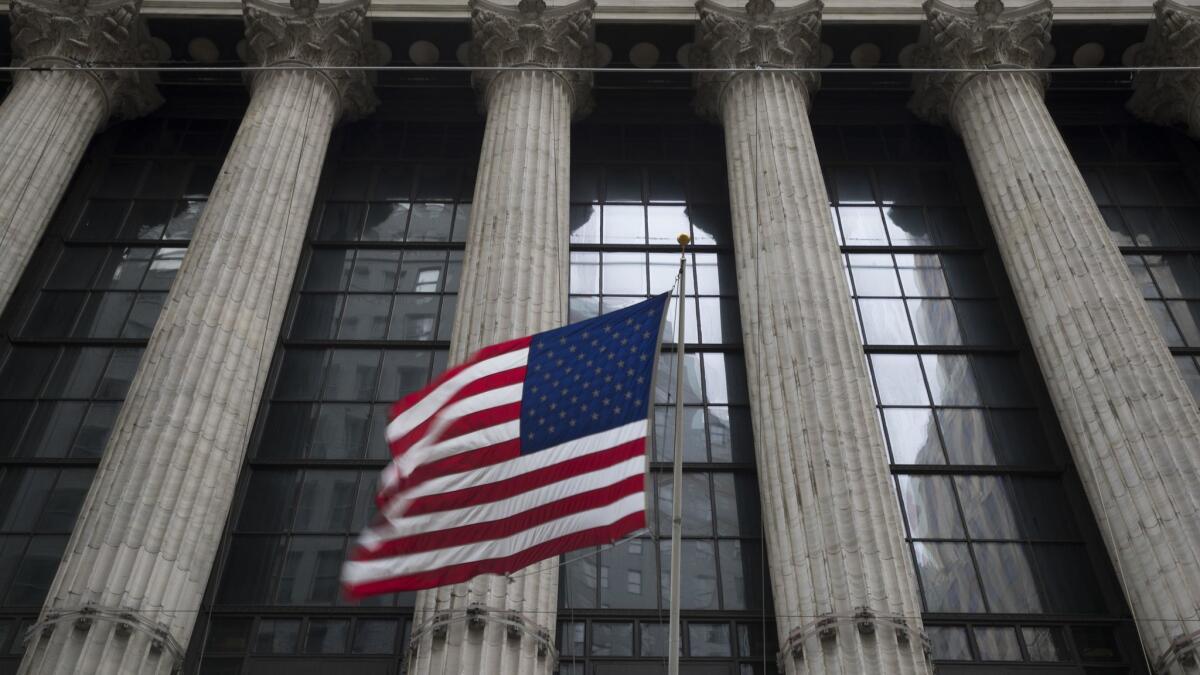Stocks skid as U.S. imposes tariffs and allies retaliate

- Share via
U.S. stocks skidded Thursday after the Trump administration said it was imposing tariffs on steel and aluminum imported from Europe, Canada and Mexico. Canada and Mexico responded with tariffs of their own, and the European Union is expected to follow suit.
Shares of American steel makers mostly rose, while industrial companies fell as they face the prospect of paying more for metals they use to make aircraft and machinery. Companies that make household items took some of the worst losses, with products such as orange juice and peanut butter considered likely targets of European tariffs.
Mexico is planning duties on U.S. exports including steel, pork products and sausages, while Canada said it will put reciprocal tariffs on steel and aluminum. The European Union also said it would dispute the U.S. tariffs with the World Trade Organization, which could take years.
Meanwhile the parties probably will keep negotiating, and contentious trade talks between the United States and China are continuing as well. Although experts say a trade war remains a remote possibility, all of those disputes have been weighing on the market for months, and the uncertainty that is creating has real effects.
David Kelly of JPMorgan Funds said the dragged-out process is discouraging businesses from investing because they don’t want to build a product only to see it burdened by tariffs.
“You can do great harm to an economy just by leaving people up in the air about what the final deal is going to be,” said Kelly, the chief global strategist of JPMorgan Funds. He said the uncertainty is undoing some of the effects of the recent corporate tax cut.
The Standard & Poor’s 500 index fell 18.74 points, or 0.7%, to 2,705.27. The Dow Jones industrial average fell 251.94 points, or 1%, to 24,415.84.
The Nasdaq composite slipped 20.34 points, or 0.3%, to 7,442.12 as technology companies such as Alphabet and Facebook bucked the market’s decline. The Russell 2000 index, which is made up of smaller companies that tend to do more business in the U.S., fell 14.32 points, or 0.9%, to 1,633.67. On Wednesday it closed at a record high.
The U.S. tariffs are to take effect Friday. The Trump administration had announced them earlier but delayed their implementation to allow for talks with the EU.
U.S. Steel climbed 1.7% to $36.87, and Century Aluminum jumped 3.4% to $17.72. They had made larger gains earlier in the day, then slipped after Canada announced reciprocal tariffs on steel and aluminum from the U.S. starting July 1.
Boeing fell 1.7% to $352.16. Caterpillar fell 2.3% to $151.91. Farm equipment maker Deere slid 3.6% to $149.51. The tariffs could increase the cost of the metals they use to make their products, and tariffs in Europe or other markets could hurt their sales.
Mexico said it would penalize U.S. imports including flat steel, cheese, fruits, pork bellies and sausage. Dairy products maker Dean Foods slid 4.3% to $9.57. Tyson Foods, which makes products including Jimmy Dean sausage, declined 3.9% to $67.47.
French officials said the EU would decide exact countermeasures in the coming weeks. European officials have threatened to retaliate against U.S. products including orange juice, peanut butter, clothing, motorcycles and bourbon. Harley-Davidson fell 2.2% to $41.08. Hormel, which makes Skippy peanut butter, declined 3.4% to $35.89.
General Motors stock jumped 12.9% to $42.70 — its biggest gain since GM went public again in 2010 after emerging from bankruptcy — after GM said SoftBank is taking a 20% stake in the GM Cruise automated division.
Discount retailers Dollar Tree and Dollar General both stumbled after they said inclement weather hurt their business in the first quarter of the year. Their results fell short of Wall Street projections, and Dollar Tree cut its profit forecast for the year. Dollar Tree shares tumbled 14.3% to $82.59. Dollar General slumped 9.4% to $87.48.
Deutsche Bank fell 4.2% to $11.08 after the Wall Street Journal reported that the Federal Reserve determined that the bank’s U.S. business is in “troubled condition.”
Guess plunged 19.4% after the clothing company issued quarterly results that disappointed investors.
U.S. crude oil slid 1.7% to $67.04 a barrel in New York. Brent crude, used to price international oils, edged up 0.1% to $77.59 a barrel in London.
Wholesale gasoline fell 1.1% to $2.16 a gallon. Heating oil fell 1.8% to $2.19 a gallon. Natural gas rose 2.3% to $2.95 per 1,000 cubic feet.
Bond prices edged up. The yield on the 10-year Treasury note fell to 2.83% from 2.85%, and financial firms’ stocks fell.
Gold slipped 0.1% to $1,300.10 an ounce. Silver fell 0.5% to $16.46 an ounce. Copper stayed at $3.07 a pound.
The dollar fell to 108.64 yen from 108.85 yen. The euro rose to $1.1685 from $1.1654.
The DAX in Germany declined 1.4%. France’s CAC 40 fell 0.5%. The British FTSE 100 index slipped 0.1%.
Asian stocks rose following big gains in the U.S. the day before. Japan’s Nikkei 225 index gained 0.8%. Hong Kong’s Hang Seng index jumped 1.4%. South Korea’s Kospi advanced 0.6%.
UPDATES:
2:35 p.m.: This article was updated with closing prices, context and analyst comment.
9:10 a.m.: This article was updated with the latest stock market figures.
This article was originally published at 7:05 a.m.
More to Read
Inside the business of entertainment
The Wide Shot brings you news, analysis and insights on everything from streaming wars to production — and what it all means for the future.
You may occasionally receive promotional content from the Los Angeles Times.










